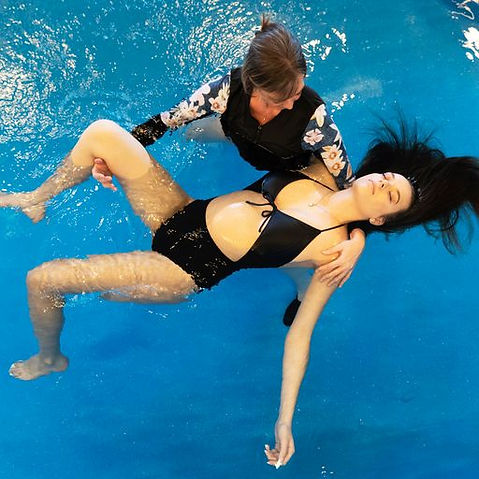


Have you ever heard of Watsu?
Watsu is a type of aquatic bodywork that was developed in the 1980s by Harold Dull, a practitioner of Zen Shiatsu. It combines elements of shiatsu massage, joint mobilization, and stretching with the soothing properties of warm water.
During a Watsu session, the client is typically cradled in the arms of the therapist while floating in a warm pool of water. The therapist then moves the client's body through a series of gentle stretches and movements, applying pressure to various points along the body to release tension and promote relaxation.
Watsu is often described as a deeply calming and meditative experience, as the buoyancy and warmth of the water can create a sense of weightlessness and allow the body to move more freely. It has been used to treat a range of conditions, including chronic pain, stress and anxiety, and post-traumatic stress disorder (PTSD), among others.
While I am currently a student of Watsu, working towards becoming a practitioner, I have embarked on bringing Aquatic Bodywork, to the beautiful Black Hills.
In Aquatic Bodywork, the therapist applies pressure and stretches to release tension and improve mobility, and may use techniques such as shiatsu, craniosacral therapy, or myofascial release to address specific areas of tension or discomfort. The buoyancy and support of the water allow for greater freedom of movement and can help relieve pressure on joints and muscles. Overall, aquatic bodywork can promote a sense of well-being and improved physical function, making it a popular option for people with injuries, chronic pain, or limited mobility.
Benefits can include:
-
Reduced stress and tension: The weightlessness of the body in water can promote deep relaxation and help to reduce stress and tension.
-
Increased flexibility and range of motion: The buoyancy of the water can help to support the body and allow for greater flexibility and range of motion.
-
Improved circulation: The warmth of the water can help to increase circulation and blood flow, which can aid in the healing process and help to reduce inflammation.
-
Reduced pain and discomfort: Aquatic bodywork can be especially beneficial for individuals with chronic pain or injuries, as the buoyancy of the water can help to reduce pressure on the joints and muscles.
-
Increased body awareness and mindfulness: Aquatic bodywork can promote a greater sense of body awareness and mindfulness, as the individual is able to focus on their movements and sensations in the water.
-
Improved balance and coordination: The resistance of the water can help to improve balance and coordination, which can be especially beneficial for individuals with neurological or musculoskeletal conditions.
Due to limited availability, these appointments must be booked with Nichole directly. Please see Contact Page for details.